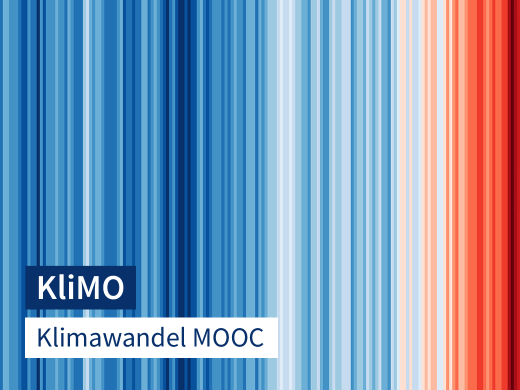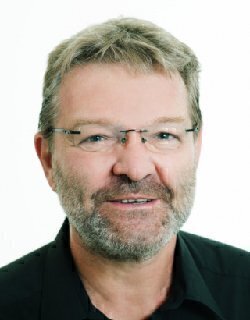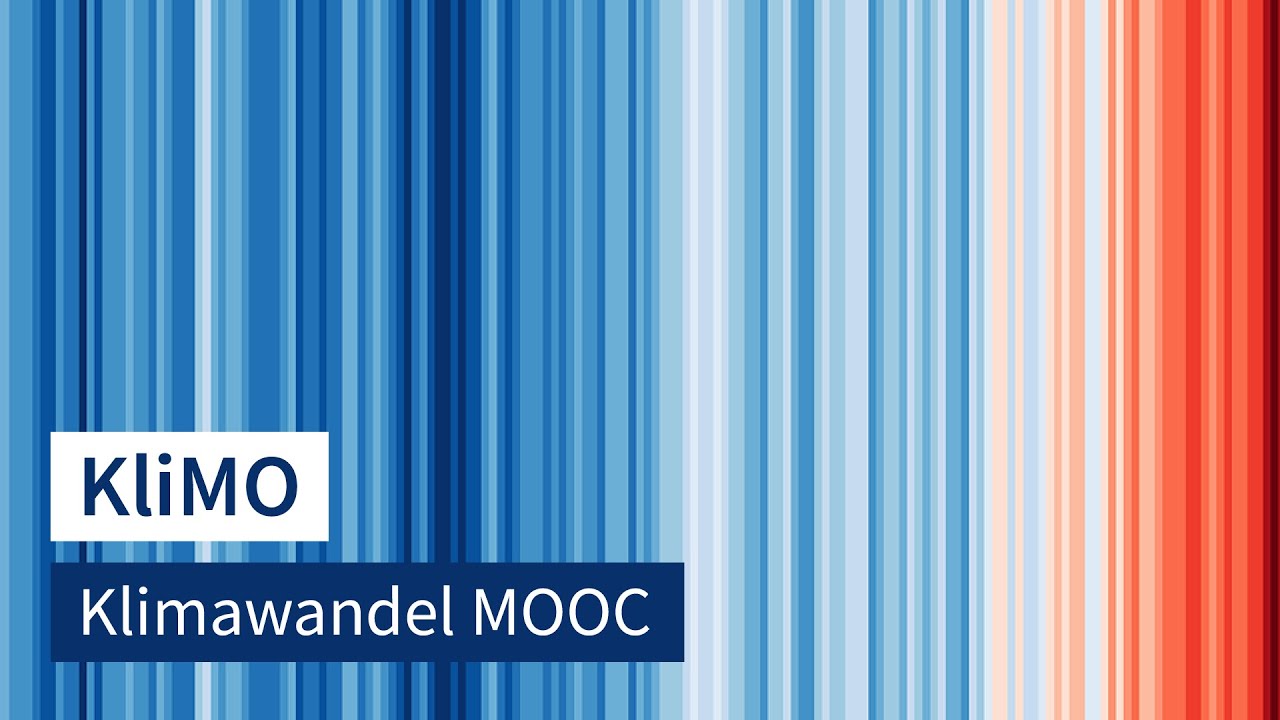


Climate Change MOOC (KliMO): Scientific foundations
University of Vienna
Prof. Dr. Thomas Glade
Tietoa
Traileri Climate Change MOOC (KliMO): Scientific foundations
Yleistä tietoa kurssista
Climate change is a global phenomenon that, in recent years, has left its niche and entered the awareness of the general public. Starting from a rather scientific exchange, this multi-layered topic has led to a broad debate on future national and international strategies in society, politics and business.
Bottom-up initiatives such as Fridays for Future have also led to the omnipresence of this topic in social and political discourse. In order to better understand and actively shape this discourse in all its aspects, it is advantageous to be aware of and consider the the scientific basis of climate change. This is the central aim of the Climate Change MOOC, abbreviated as KliMO.
As the topic of climate change covers many areas, a holistic approach from inter-, intra-, trans- and multidisciplinary perspectives is required. This course includes contributions from selected university professors, national and international experts from various disciplines, including geography, geophysics, risk management, climate research and institutions such as the Austrian Central Institute for Meteorology and Geodynamics (ZAMG), the Austrian Federal Ministry of the Interior (BMI), the Department of Torrent and Avalanche Control and Protection Forest Policy (WLV), the Austrian Federal Ministry of Agriculture, Regions and Tourism (BMLRT) and Greenpeace.
Sisältö
Kurssin sisältö
In a total of 4 parts and 12 units, KliMO examines this comprehensive range of topics from a holistic geographical approach with various natural and social science perspectives. You will learn how to deal with terms such as climate, emissions balancing and socio-ecological transformation. Among other things, the following key questions are addressed:
- What are the bio-physical relationships in the climate system?
- How does a climate system work over millions of years, and how does current climate change differ from this?
- What effects does climate change have on the environment and society?
- How are urban areas and societies affected by climate change?
- What does climate protection look like in practice?
KliMO invites you to actively engage with these questions. You can expect exciting videos and practical work assignments involving your own research and data processing. In addition, the forum offers you the opportunity to exchange ideas with other learners, to further explore what you have learned and to formulate and discuss your own thoughts.
Kurssin tavoitteet
The central learning goals of KliMO include
- To provide basic knowledge and skills as well as analysis skills of the causes and consequences of climate change
- Teaching scientific approaches to problems from different perspectives and developing methodology skills
- Critical classification of causes and consequences of climate change as well as climate protection measures, climate adaptation strategies and their effects
Pohjatiedot
No prior knowledge is required for participation. Knowledge of German is necessary as the course content is presented in German, but some of the literature references are in English.
Kurssin toteuttaminen
The KliMO consists of 12 units, which are structured in 4 parts. Each unit deals with the respective topic in depth. You can expect exciting and diverse lectures, interviews with selected experts and insights into local research projects. This will give you wide-ranging insight into the inter-, intra-, trans- and multidisciplinary perspectives on climate change.
Part 1: Components and processes of the global climate system- Unit 1: Basic concepts
- Unit 2: Processes in the climate system
- Unit 3: Modeling the climate system
- Unit 4: Natural drivers of climate change
- Unit 5: Anthropogenic contribution to climate change
- Unit 6: Extreme events
- Unit 7: Environmental impacts
- Unit 8: Climate change and rural areas
- Unit 9: Climate change and migration
- Unit 10: Climate change and the city
- Unit 11: Regional impacts
- Unit 12: Socio-ecological and digital transformation
Todistus
After successfully completing a unit, participants will receive a digital confirmation, also called “badge”. A unit is considered successfully completed if at least 75% of the questions in the final quiz of the unit have been answered correctly.
Lisenssi
Tämän työn lisensoija on CC BY-SA 4.0
Kursübersicht
- Lektion 1: Überblick und Grundbegriffe
- Willkommen bim KliMO
- Begrüßung zu Lektion 1
- Geschichte der Klimaforschung
- Beobachteter Klimawandel Global und in Österreich
- Komponenten des Klimasystems
- Klimamessung
- Klimamonitoring
- Lektion 2: Prozesses im Klimasystem
- Begrüßung zu Lektion 2
- Globale Strahlungsenergiebilanz
- Global Warming auf dem Bierdeckel
- Zirkulation der Atmosphäre
- Zirkulation des Ozeans
- Thermohaline Zirkulation
- Lektion 3: Modellierung des Klimasystems
- Begrüßung zu Lektion 3
- Klimasimulation – Szenario – Klimamodell
- Modellprojektionen der globalen Temperatur und Niederschlag
- Temperatur und Niederschlag
- Globale Klimamodellierung
- Regionale und lokale Klimamodellierung
- Geschichte der Klimamessung
- Lektion 4: Natürliche Treiber des Klimawandels
- Begrüßung zu Lektion 4
- Erdbahnparameter und Sonnenaktivität |
- Vulkanismus und Plattentektonik
- Biotisch klimatische Rückkoppelungen
- Strahlungshaushalt I
- Strahlungshaushalt II
- Boden Kammer Messung I
- Boden Kammer Messung II
- Lektion 5: Anthropogener Beitrag zum Klimawandel
- Begrüßung zu Lektion 5
- Beiträge zum Klimawandel
- Beiträge zum Klimawandel II
- Bilanzierung von Emissionen
- Emissionen nach sozioökonomischen Gesichtspunkten Interview mit Adam Pavlov, Greenpeace Austria
- Individuelle vs politische Verantwortung Interview mit Jan Burch, Germanwatch
- Lektion 6: Extremereignisse
- Begrüßung zu Lektion 6
- Definition von Extremen
- Zeitliche Dimensionen
- Beispiele für Extremereignisse
- Handlungspositionen und Anpassungsstrategien
- Extreme aus der Sicht des Bundesministeriums für Inneres
- Extreme aus der Sicht der Zentralanstalt für Meteorologie und Geodynamik ZAMG
- Extreme aus der Sicht des Bundesministeriums für Landwirtschaft, Region und Tourismus
- Zusammenfassung
- Lektion 7: Umweltauswirkungen
- Begrüßung zu Lektion 7
- Sphären der Umwelt
- Beispiele von Umweltauswirkungen
- Risiko aus natur, ingenieurwissenschaftlicher und sozioökonomischer
- Umweltauswirkungen aus der Sicht des Bundesministeriums für Inneres
- Umweltauswirkungen der Sicht der Zentralanstalt für Meteorologie
- Umweltauswirkungen aus der Sicht des Bundesministeriums für Landwirtschaft
- Menschliche Hochwasserprävention
- Natürliche Hochwasserprävention
- Auswirkungen des Klimawandels auf Hochwasser
- Risikomanagement der Sicht der Austrian Strategy for Disaster Risk Reduction ADSR
- Zusammenfassung
- Lektion 8: Klimawandel und ländliche Räume
- Begrüßung zu Lektion 8
- Auswirkungen des Klimawandels Dimensionen und Wirkweisen
- Auswirkungen des Klimawandels Beispiele
- Konzepte Vulnerabilität, Risiko, Resilienz
- Auswirkungen des Klimawandels in Thailand
- Klimagerechtigkeit
- Walkthrough Abbildung zu Klimagerechtigkeit erstellen
- Lektion 9: Klimawandel und Migration
- Begrüßung zu Lektion 9
- Klimawandel und Migration Begriffe
- Klimawandel und Migration Zahlen
- Klimawandel und Migration komplexe Wechselwirkungen was wir wissen
- Klimawandel und Migration Perspektiven und mediale Repräsentation
- Klimawandel und Migration Migration als Anpassung
- Migration und Anpassung Interview mit Prof Patrick Sakdapolrak, Universität Wien
- Lektion 10: Klimawandel und Stadt
- Begrüßung zu Lektion 10
- Klimawandel und Stadt
- Urbane Verwundbarkeit verstehen, bewerten und Lösungssätze ableiten
- Anpassungsskapazitäten und Handlungsstrategien
- Kommunikation und Mutual Learning
- Lektion 11: Regionale Auswirkungen
- Begrüßung zu Lektion 11
- Bedeutung der Hochgebirge
- Gletscher und Klimawandel
- Permafrost und Klimawandel
- Forschung im Hochgebirge Das PHUSICOS Project
- Lokale Klimawandelanpassungsstrategien
- Meereisrückgang in der Arktis
- Arktische Permafrostböden und Klimawandel
- Kohlenstoffsenke Moor
- NoeSLIDE Definition gravitative Massenbewegungen
- NoeSLIDE – Forschungskontext
- Das NoeSLIDE Projekt
- Lektion 12: Sozial-politische und digitale Transformation
- Begrüßung zu Lektion 12
- Klimawandel im gesamtgesellschaftlichen Kontext
- Klimaaktivismus
- Digitale Transformation
Included in courses at the University of Vienna
Parts of KliMO are used as part of the Extension Curriculum (EC) “Climate Change: Scientific Foundations” at the University of Vienna. These parts are not graded directly, but are incorporated into the teaching content. The assessment of the EC is based on the courses offered. It is therefore highly recommended to complete all the units in order to register for an examination in the extension curriculum. Successful completion of the respective units is confirmed with badges.Kurssin ohjaaja

Prof. Dr. Thomas Glade
Prof. Dr. Thomas Glade majored in Geography at the Karls-Ruprechts University in Heidelberg from 1988 to 1994, with the additional minor subjects Geology and Law. After his dissertation from 1994-1997 at the University of Wellington, New Zealand, he habilitated in 2004 at the Rheinische Friedrich-Wilhelms University in Bonn, Germany. Since 2006 he has been Professor of Physical Geography at the University of Vienna, specializing in geomorphological systems and risk research. He was Head of the Institute of Geography and Regional Research (2010-2015) and Vice Dean for Teaching at the Faculty of Earth Sciences, Geography and Astronomy (2017-2019). In addition, he chaired the working group for natural hazards and risks of the German Geographical Society from 2001-2010, has been involved in geographieverband.at since 2011 (2017-2020 board) and was active in the CERG European Center of Geomorphological Hazards, starting in 2003 in the Steering Committee and as President from 2014 - 2019. He also attaches great importance to life long learning - since 2013 he has headed the MSc. OeRISK - Risk Prevention and Disaster Management, which is established at the Postgraduate Center of the University of Vienna.
Kirjaudu sisään ja ilmoittaudu Tällä hetkellä: 1069 Osallistujat
Maksuton kaikille € 0.00
Yhteistyökumppanit
The following people from the Faculty of Earth Sciences, Geography and Astronomy were involved as lecturers in the design and implementation of the respective units of the climate change MOOC KliMO:
Dr. Blaž GASPARINI (Research Associate, Climate Science Working Group, Institute of Meteorology and Geophysics)
Prof. Dr. Thomas GLADE (Course Director, Professor of Physical Geography, Institute of Geography and Regional Research)
Prof. Dr. Stephan GLATZEL (Professor of Geoecology, Institute of Geography and Regional Research)
Prof. Dr. Kerstin KRELLENBERG (Professor of Urban Studies, Institute of Geography and Regional Research)
Dr. Philipp MARR (Course Coordinator, Senior Scientist Working Group Physical Geography, Institute of Geography and Regional Research)
Dipl.-Ing. Andreas MAIER (Research Associate, Geoecology Working Group, Institute of Geography and Regional Research)
Dr. Harald STERLY (Senior Scientist, Population Geography Working Group, Institute of Geography and Regional Research)
Prof. Dr. Aiko VOIGT (Professor of Climate Science, Institute of Meteorology and Geophysics)
The lecturers would like to thank the following contributors, without whom the Climate Change MOOC could not have been created in this way.
Many thanks for their contribution to:
- Jan BURCK (Germanwatch, D)
- Peter FRANK (Tyrol Chamber of Agriculture, A)
- Stefan HASELBERGER (University of Vienna, A)
- Dr. Klaus HASLINGER (Central Institute for Meteorology and Geodynamics (ZAMG), Vienna, A)
- Dr. Johann HIEBL (Central Institute for Meteorology and Geodynamics (ZAMG), Vienna, A)
- Dr. Sabine KRAUSHAAR (University of Vienna, A)
- Dipl.-Met. Matthias LANGER (Central Institute for Meteorology and Geodynamics (ZAMG), Vienna, A)
- Dipl.-Ing. Andreas MAIER (University of Vienna, A)
- Harald MAYNOLLO (District Forestry Inspectorate Landeck, A)
- Prof. Dr. Dirk NOTZ (University of Hamburg, D)
- Adam PAVLOV (Greenpeace, A)
- PD Dr. Florian RUDOLF-MIKLAU (Head of the Torrent and Avalanche Control and Protection Forest Policy Department (WLV), Federal Ministry of Agriculture, Regions and Tourism (BMLRT) , Vienna, A)
- Prof. Dr. Patrick SAKDAPOLRAK (University of Vienna, A)
- Dr. Michael STAUDINGER (former Director of the Central Institute for Meteorology and Geodynamics (ZAMG, Vienna, A)
- Dr. Robert STOCKER (Head of the Department of State Crisis and Disaster Management and Civil Security Coordination (SKKM), Federal Ministry of the Interior (BM.I), Vienna, A)
- MSc. Margherita STUMVOLL (University of Vienna, A)
- Ulrike TOTSCHNIG (KLAR! Kaunergrat, A)
- Dr. Rosmarie de WIT (Central Institute for Meteorology and Geodynamics (ZAMG), Vienna, A)
And finally, we would also like to thank the entire CTL team, who supported us so actively and persistently in the creation of the MOOC.

University of Vienna
Wien
